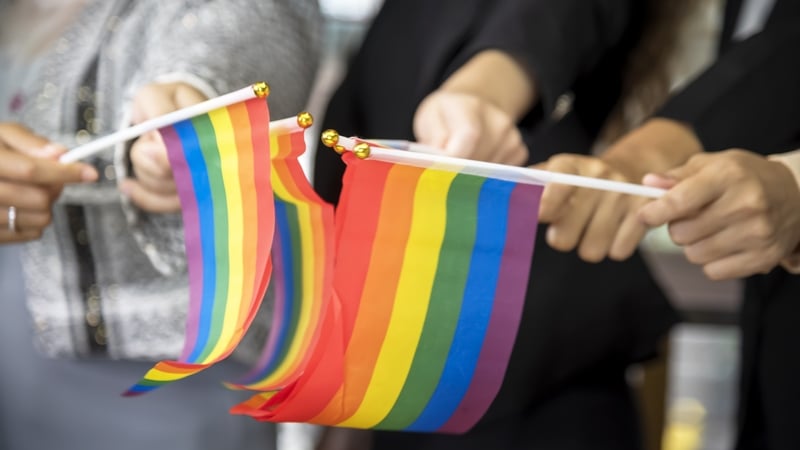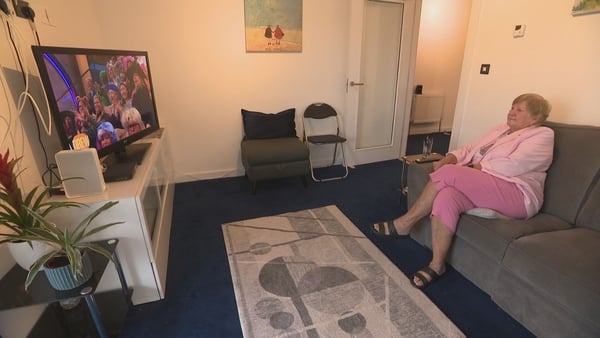LGBTQI+ people continue to experience hate-motivated violence and discrimination, according to a new report from the European Union Agency for Fundamental Rights (FRA).
A survey of more than 100,000 people in 30 EU countries last year found that while people are living more openly, harassment, bullying and violence are on the rise.
Even as more LGBTQI+ people feel able to be open about their identities, the discrimination they face "remains high", with "more violence, harassment and bullying" than before, the FRA said.
The survey - the third of its kind since 2012 - found the share of respondents aged 15 years and older who are often or always open about being LGBTQI+ was higher in 2023 (52%) than in 2019 (46%).
However, violence increased a little, or a lot, in the past five years, according to more than half the respondents (59%).
The proportion of those experiencing hate-motivated violence, including physical and sexual attacks, was higher in 2023 (14%) than in 2019 (11%).
More than half of the respondents (53%) believed prejudice and intolerance had increased and about one in four respondents (26%) believed the government in their country combated prejudice and intolerance effectively.
The findings are a "clear red flag" even though they "present a paradox," said agency director Sirpa Rautio.
"On the one hand, people are becoming more open about their sexual orientation," Ms Rautio said in the report.
"On the other hand, everyday harassment, bullying in schools, hate crime and alarmingly high rates of violence tell another story," she warned.
"Most (LGBTQ people) still avoid holding hands with their partner in public for fear of being attacked," a statement accompanying the report said.
Trust in government efforts
Ireland is among a number of countries where the level of trust in government efforts has fallen since the previous survey in 2019 (from 67% down to 40%).
Trust in the governments of Luxembourg, Malta, the Netherlands, Sweden, Finland, Portugal, Denmark and Greece has also fallen.
Substantial variations were observed between countries in the overall discrimination rates for trans women, with the highest rates observed in Portugal (77%), Italy (75%) and France (70%), followed by Ireland (69%), Belgium (67%) and Germany and Austria (both 65%).
The lowest prevalence values of discrimination are in Finland (41%) and Czechia (44%).
Most trans men who feel discriminated against are in Bulgaria (82%), Greece (78%) and France (71%), while the fewest are in Sweden (41%).
Reporting incidents of discrimination
The survey asked respondents who felt discriminated against whether they or anyone else reported or filed a complaint to any organisation or institution about their most-recent experience of a discriminatory incident.
Overall, across the EU, the results were similar to those of the 2019 survey.
Only 11% incidents of discrimination are reported anywhere, with the highest rates in Malta (20%), Italy (16%), France (15%) and Belgium and Ireland (both 14%).
The lowest proportions of those reporting discrimination incidents in the 12 months before the survey included Poland (5%), as well as in Czechia, Croatia and Hungary (all 6%).
The survey found that while one-in-two are now open about who they are, most still avoid holding hands with their partner in public for fear of being attacked and more than one in two were victims of hate-motivated harassment, up from one in three in 2019.
Of the respondents who experienced an incident of hate-motivated violence, 18% reported it to any authority or organisation.
The highest reporting rates are in Cyprus and Finland (both 29%), the Netherlands and Portugal (both 28%) and Ireland (26%).
The lowest rates of reporting are in Luxembourg (5%), Hungary (6%), Romania (9%) and Czechia and Malta (both 11%).
Banning conversion practices
The study noted that in 2016, Malta was the first EU member state to ban conversion practices which aim to change, repress or suppress sexual orientation or gender identity.
Ireland is listed alongside Austria, Belgium, Cyprus, the Netherlands, Poland and Portugal as introducing "initiatives for banning conversion practices".
There is a commitment in the programme for government to introduce legislation in Ireland, however, the general scheme of the Bill has been with the Office of the Attorney General for a number of years.
Minister for Equality Roderic O'Gorman told Labour Party leader Ivana Bacik in January that given the "potential complex and sensitive nature of the proposed legislation, the Government is carefully considering the underpinning policy matters to ensure that vulnerable members of society are protected from these harmful practices and that necessary and appropriate services for those with concerns in areas of sexual orientation and gender identity are not affected".
Many of the findings of today’s EU study are echoed in recently published research by Trinity College Dublin in conjunction with BelongTo.
'Being LGBTQI+ in Ireland’ highlighted "significant challenges" experienced by younger age groups and the transgender and gender non-conforming communities.
It showed that the mental health and wellbeing of younger members of the LGBTQI+ population in particular had declined since 2016.






